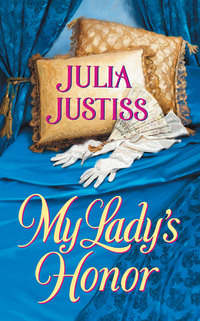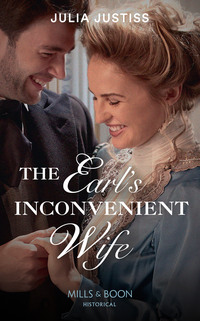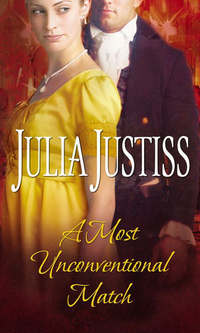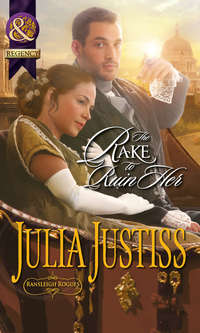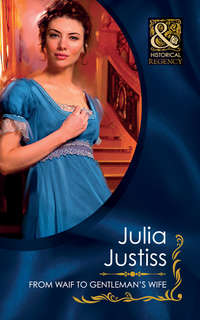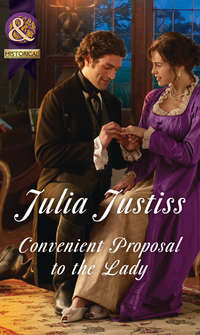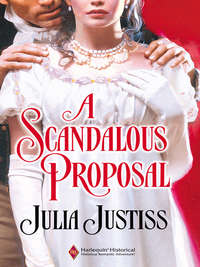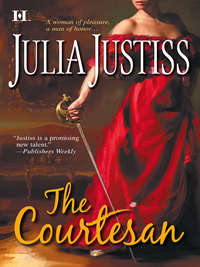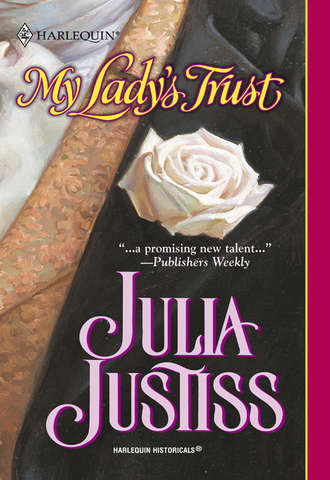
Полная версия
My Lady's Trust
He laughed out loud. Greek, no less! How could he have thought her intellect dull, even for a moment?
Maybe it was the shock of Kit’s close brush with death that heightened all his senses to so keen an edge. Normally he was the most analytical of men—the successful performance of his job depended upon it—but the power of whatever arced between them this morning defied analysis. This was alchemy, elemental substances bonding through some force buried deep within their respective natures, a force not to analyze, but to experience.
He intended to do so. Once Kit was out of danger, he wanted to experience every thrilling facet the unprecedented power of this mutual attraction promised.
That decided, he switched directions and headed for the breakfast room. The more he knew of Mrs. Martin, the more tools he’d possess to lure her to him—and turn his molten imaginings into reality.
Time to prime the voluble squire’s conversational pump.
He was pleased to find Squire Everett already at breakfast. “Come in, come in, my lord. Fine morning for a ride, eh?”
“A wonderful morning indeed.”
“M’sister won’t be down this morning—female palpitations or some such, so don’t stand on ceremony. Please, fill your plate. Marsden will pour your tea.”
“Have you had a dish sent up to Mrs. Martin yet?” he asked casually.
“Cook will take care of that. Must see that she gets her nourishment. Thin as a wraith anyway—can’t have her going into a decline.”
“Indeed not. What an invaluable member of the community! Has she resided here all her life?”
“No, the last few years only. Her late aunt, Mrs. Hastings—a most genteel lady, God rest her soul—owned the cottage first. Mrs. Hastings helped her husband, a botanist he was, in his studies of herbal plants, and became something of an expert herself.” The squire paused to take a bite of kidney pie and waved a finger at Beau. “So you see, my lord, ’tis no crone of a medicine woman who had the teaching of Mrs. Martin, but the wife of an Oxford don! Anyways, once the folk hereabouts learned of Mrs. Hastings’s skill, they took to consulting her. And when Mrs. Martin contracted a puerile fever, her family sent her to her aunt. Nearly died, Mrs. Martin did, and took the better part of a year to recover.”
“I’m sure her neighbors are most grateful she did.”
“God’s truth, that!” The squire motioned the footman to pour him another cup. “Given the, ah, weakness of the local sawbones, there’s a number of folk who’d be in bad frame indeed, were it not for Mrs. Martin.”
“My own brother included.”
The squire nodded. “Glad to know you realize that!”
“Her husband was a military man, you said. In what regiment?”
The squire stopped buttering his toast and looked up. “Can’t say as I know. Does it matter?”
Back off, Beau. “Not really. I’m trying to ascertain how I might best reimburse her for the time and skill she’s expended for my family. She would not accept payment in coin, I expect, but I should like to offer some gesture of appreciation. Is she perchance a reader?”
The squire chuckled. “My, yes! Quite a little bluestocking. Why, when she was laid up recuperating from her illness, I swear she must have read every musty tome in my library twice through. Not that I grudged her the loan of them, of course. Nay, I was glad to see them off the shelf for better reason than to make way for Hattie’s feather duster.” The squire put down his fork, suddenly serious. “Mustn’t think she’s one of them annoying, opinionated females who are always trying to tell a body what to do. Not a bit of it! Our Mrs. Martin’s quiet and deferential, a real lady.”
“So she has shown herself, under the most trying circumstances,” Beau agreed, noting the squire’s slight stress on the possessive “our.” “The rest of her family is not from this county?”
“No. Now that I think on it, I’m not sure where her parents live—nor her husband’s people.” The squire shrugged. “Never seemed important. She’s quality, as one can tell by looking at her, and that’s all that matters.”
“Of course.” Beau paused, choosing his words with care. “It does seem to me somewhat—odd, though, that she should be living alone, without any relations to accompany her. I must confess I was shocked when I went to fetch her and found not a single servant. I cannot help but think she stands in need of better protection.”
“Protection?” The squire stiffened and threw him a suspicious glance. “She’s well protected now, sir. I’d have a servant at the cottage full-time, if that’s what you’re hinting, but she’ll not hear of it. And my grooms have standing orders to keep a close eye on the place.”
Beau returned a bland smile. “That’s not the same as having her safe within one’s household. Perhaps I should speak to my sister—”
“No need for that!” the squire interrupted, his glance turning frostier. “She’d not stir from Merriville—likes to feel useful, she tells me. In any event, I’ve plans for her eventual protection—quite legitimate plans! No need to disturb your lady sister—Mrs. Martin will be well cared for, I assure you.” Pushing his chair back, the squire rose. “I’ll just go check on that breakfast plate.”
Giving Beau another sharp look, the squire paced out.
Beau savored the rich scent of his tea and smiled. So, as he’d suspected, the squire had “legitimate” plans in regard to Mrs. Martin. But though a match of such unequal age would not be unusual, often resulting in affection on both sides, he was certain the lady did not in any way reciprocate the squire’s tender regard.
Thanks be to God.
To his eye, Mrs. Martin’s reaction to the squire’s gallantry indicated disinterest cloaked in polite avoidance rather than coquetry. Nor, given the care she took to mask her beauty, did it appear she sought to attract any of the eligible gentlemen hereabouts.
Twofold thanks to heaven.
Why a vulnerable lady in such a precarious financial position would not wish to ensnare the affections of a potential suitor puzzled him. Solving that mystery was the key, he suspected, to unfettering the attraction between himself and Mrs. Martin.
Fortunately, uncovering people’s emotions and intent was a skill he’d perfected when still a lad, fascinated by puzzles of all sorts. While mastering chess, he’d discovered to his amusement that he could often learn as much about his adversary’s strategy from watching the reactions of face and body as by following the play. A sudden widening of the eyes, a quick indrawn breath, the alerting of the body and tensing of shoulders might indicate an opportunity discovered, or a check about to be set. Intrigued, Beau began to actively track such reactions. By the time he left Eton for Oxford he was able to pick up much more subtle signs.
Which allowed him to enjoy a quite profitable career at cards while at university. In addition, his ability to sense out which of two boxers would triumph, which jockey would bring home the winning horse, or which of two gentlemen would win a bet had led friends—and opponents—to wait on his choices and seldom wager against him.
And later led him to the secret career he now pursued, assisting Lord Riverton, an older Oxford classmate and now a cabinet member, in rooting out governmental corruption.
Given the strength of his need to disarm the wariness of Mrs. Martin, he gave thanks both for his skill and the invaluable contacts he’d accumulated over the years.
The news of Kit’s accident had pulled Beau from a house party, where the number of congenial friends present had sweetened the business of observing a high-ranking government official suspected of embezzlement. His agents were at work amassing invoices and shipping figures—hence the satchels arriving daily by courier. The accumulating evidence, observation and instinct all told him the suspect he’d been watching was indeed the architect of the scheme.
Though he’d put all thought of miscreants aside while Kit’s life hung in the balance, once he was assured his brother was truly out of danger and Ellie arrived to oversee Kit’s care, duty compelled him to return to London and finish his assignment. Still, he could spare a few more days to recover from the shock of nearly losing a sibling—and to figure out how best to win the trust of the cautious Mrs. Martin. For when he returned to check on his convalescing brother, he intended for her to welcome him back with all the fire he knew she possessed.
As he drained his cup and took the stairs to Kit’s room, Beau considered various explanations for Mrs. Martin’s atypical behavior. Perhaps the lady avoided gentlemen and garbed herself in gowns that camouflaged her beauty because her heart still belonged to her late husband. If she didn’t avoid men out of heartache, she might do so from distaste, though he’d not noticed in her interactions with Mac, the squire, or his brother anything to indicate a dislike for men in general. Or perhaps she brooded over some disappointment in love.
The powerful physical connection that flared between them did not support any of those theories. Besides, he sensed in her not aversion, disdain, or the despair of lingering grief, but…a wary watchfulness.
The hallmark of someone with secrets to hide.
He stopped dead, arrested by the conclusion. He might be wrong—occasionally he was—but he didn’t think so.
He continued his analysis, excitement accelerating the pace. Mrs. Martin apparently moved easily among—indeed, was sought out by—the community in and around Merriville, so she didn’t avoid all society.
Mrs. Martin the widowed healer met society, he amended. Mrs. Martin the woman hid behind shapeless gowns and voluminous caps. What could a lovely lady of gentle birth feel so obliged to conceal that she tried to make her person virtually invisible?
Beau couldn’t imagine. But with urgency thrumming in his blood and the goad of an imminent departure, he intended to bend every effort to find out.
Chapter Five
Her palms damp with nervousness on the wicker basket she carried, at precisely four o’clock Laura Martin walked into the entrance hallway to meet the Earl of Beaulieu.
Despite her exhaustion this morning, she’d lain awake wondering if there might have been some way she could have avoided this excursion. Before falling into a leaden sleep, she’d concluded there was none, save a blunt refusal that would have been as ungracious, given the concern the earl expressed about her well-being, as it was insulting.
She’d blundered badly again, being caught with that volume of Homer. No chance now of Lord Beaulieu believing her to be dull-witted. But a scholarly lady could still be a recluse of little social skill—indeed, before her marriage had she not been just such a girl? As long as she kept conversation to minimum and behaved with an awkwardness that, given the state of her nerves, she would not have to feign, the outing might pass off well enough.
But as she stepped out under the entry archway to await the approaching gig, Laura couldn’t help but feel a surge of gladness. The afternoon was as fair as the earl had promised, gilded with the special light that only occurs in late autumn when balmy breezes, teasing reminders of the summer just past, seduce the mind into forgetting the cold threat of winter to come. The sun-warmed herbs in her garden would greet her with a bouquet of piquant scents, the beds of mums and asters with a painter’s palette of russets, oranges, golds, lavenders and pinks.
After having been trapped indoors for nearly a week, she simply would not let the exasperating, unnerving seesaw of reaction the earl seemed always to evoke in her spoil her enjoyment of this perfect afternoon.
Given the paucity of her experience with men, it had taken her time to realize, with some chagrin, that at least part of the uneasy mix was an entirely carnal attraction. Once long ago, when young Lord Andrew Harper took her walking in her mother’s garden, she’d experienced the same quivery awareness and agitation. Acutely conscious of the muscled masculine form beneath Lord Andrew’s tight-fitting coat and buff breeches, she’d both longed for and been terrified that he might kiss her.
He hadn’t, though he’d looked into her eyes with the same searing intensity as the earl. Soon after that walk, her father informed her he’d accepted the distinguished and much older Lord Charleton’s offer for her hand, putting an end to titillating interludes in the garden.
Could the earl desire her, too? A flattering thought, though ludicrous. If the Earl of Beaulieu did find his brother’s dowdy nurse attractive, it would only be because gentlemen, as she knew well, were not particularly discriminating in their passions. Any minimally satisfactory female would do until a more appealing prospect happened along, and there were surely few prospects in Merriville.
She was still smiling at the notion of the Lord Beaulieu ogling the village baker’s buxom daughter when the earl pulled up in the gig.
Sunlight glistened in the burnished ebony of his dark hair and warmed the brown eyes to amber flame. Apollo cast in bronze, she thought, as a now-familiar slash of awareness stabbed her belly and quivered down her legs. She didn’t realize she was standing motionless, simply staring at him, until the earl addressed her.
“Should I call someone to assist you up? I’m afraid the horse is so fresh, I cannot leave him.”
“No, I can manage,” she replied, cheeks warming. The cat looking at the king, pathetic as the old nursery rhyme.
Transferring the reins to one hand but keeping his eyes on the restive chestnut, Lord Beaulieu leaned over to steady her elbow as she climbed in, his touch light and impersonal. Nonetheless, tension simmered between them as she took her seat.
“Is the day not truly as splendid as I promised?” he asked, and turned to give her a brilliant smile so full of comradely enjoyment she had to smile back.
“Indeed it is. Thank you for offering to drive me.”
“Let’s be off, then. Do you need to gather wild herbs as we go, or just those in your garden?”
“I need only garden-grown medicinals.”
“Nonetheless, if you spy anything on the way that you can use, let me know. This fine animal isn’t capable of blazing speed, so it will be no trouble to bring him to a halt. Squire Everett told me your uncle was a botanist, and you came to Merriville to be treated by your aunt. Had you worked with herbs before then?”
Laura tensed. “No.”
But his tone was easy, almost teasing as he continued. “I understand you were quite ill. A lady whose mind is active enough to acquire Greek must have found the forced inactivity of convalescence irksome. Learning about herbs would have blunted the frustration, I should guess.”
She glanced at him, surprised at his perspicacity. “Yes, it did.”
“A fascinating art, the business of healing. From time immemorial men have attempted to understand it, sometimes with appalling results. Imagine, recommending the ingestion of black powder and lead to relieve stomach distress!”
She laughed. “Barbarous indeed.”
“Did your aunt start treating illness at your uncle’s behest? Or out of her own concern?”
Laura paused, uncertain how to frame a monosyllabic answer—or whether, in truth, she needed to do so. Unlike the unnervingly probing inquiry he’d subjected her about her family the last time he drove her, these questions were less personal.
Perhaps, given his brother’s illness, Lord Beaulieu had developed a genuine interest in the practical use of herbs. What harm if she replied at more length on this relatively safe topic?
Cautiously, tracking his reaction with quick, cautious glances, she began, “My uncle studied the makeup of plants and how the elements in them affect healing. He believed, and my aunt practiced, that only natural materials, especially such long-utilized botanicals as willow bark, foxglove, rosemary, and the like be used to treat the sick, and then in small doses. ’Tis best to intervene as little as possible, let the body’s natural strength heal itself.”
“That sounds wise. Do we pass any beneficial wild herbs on our route?”
“Several, though they are not at the peak moment for harvesting now.”
“Point them out, if you would.”
And so during the remainder of the drive, she indicated stands of willow and horehound, pockets of tansy, goldenseal and echinacea. At his prompting, she added details of the teas, infusions and poultices one could make from them.
Having the earl’s intense, probing mind focused on treatments rather than the individual describing them was an immense relief. Though a strong awareness of him as a man still bubbled at the edges of consciousness, by the time they reached her cottage Laura had relaxed to a degree she wouldn’t previously have believed possible in his lordship’s company.
As soon as Lord Beaulieu handed her down from the gig, which he did with business-like efficiency that further reassured her, Misfit bounded up. Whining with joy, tail wagging at manic speed, he blocked her path and insinuated his head under her fingers. Perforce halted, Laura laughed and scratched hard along the knobby bones at his tail while the dog groaned with delight.
The earl laughed, as well. “I believe he missed you.”
“He becomes distressed if I’m away for long.”
“Don’t like being left alone, do you, old boy?” Lord Beaulieu reached over to rub his long fingers behind the dog’s ears. “Misses his fellows, too, I’ll wager. Why doesn’t the squire take him out with his pack?”
“Having been caught in a poacher’s trap as a pup, he shies so at the sound of gunfire he’s useless as a hunting dog. After I healed him, the squire let me keep him.”
“As your guardian?” the earl guessed.
She shrugged. “Something like, I suppose. Please, do go in. I’m afraid I haven’t much to offer, but there will be cool water in the kitchen.”
“Knowing you’d likely not have anything in the house, I had the squire’s cook prepare us a basket of refreshments. I’ll fetch it when you’re ready.”
That so wealthy a gentleman, who doubtless had his every need anticipated by a small army of servants at every one of his numerous establishments, should have noted and planned for that small detail impressed her. “Thank you. Should you like to wait in the parlor while I tend the garden? I have a set of the studies my uncle published. You might find them interesting.”
“I’m sure I should, but I can’t imagine remaining indoors on so glorious a day. Let me help you.”
The idea of the impeccable earl down on his knees pulling weeds was too ludicrous to resist. Stifling a grin, she recommended that if he preferred to stay outside, he might seat himself on the old willow bench on the porch.
The same one, she recalled with a jolting flash of memory, on which he’d discovered her drying her hair that afternoon.
If he remembered the incident, too, he gave no sign. Thanking her, he inclined his long form on the bench and sat watching her.
At bit uncomfortable under his scrutiny, she donned her faded apron and a tattered straw bonnet. But after a few moments she fell into the familiar, satisfying routine, wholly absorbed in freeing the beds of weeds and snipping the leaves, stems and branches she needed.
A short time later he materialized at her side, startling her. To her surprise and amusement, there he remained, questioning her about each plant she weeded out or clipped to save, holding the trug for her to deposit the harvested bounty, and twice, over her laughing protests, carrying off a load of weeds.
After she’d finished, the earl fetched the picnic basket. Once more claiming it was too lovely to go indoors, he insisted on seating her beside him on the willow bench and unpacking the refreshments there.
Having abandoned them during the dull weeding process to sniff out rabbits or other pernicious vermin, at the first scent of food Misfit ambled back, waiting at Laura’s feet with polite, rapt attention for the occasional tidbit.
The golden afternoon dimmed to the gray of approaching dusk and the mild air sharpened. As if sensing his mistress would soon depart, Misfit trotted off and brought back a fallen tree limb, then looked up at Laura with tail wagging, an irresistible appeal in his eyes.
“All right, but only for a few moments,” Laura told him. With a joyful bark, Misfit dropped the limb and danced on his paws, awaiting her throw.
She lobbed it to the far wall, watching with a smile as the dog raced after, a dark streak of motion in the fading daylight. He bounded back, did a little pirouette before her, and dropped the stick once more.
Lord Beaulieu snatched it before she could, and after a grimace at its condition, threw it again, clear over the fence and into the brush beyond. The hound rushed to the wooden barrier and then out the gate.
“He’ll love that,” Laura said. “’Tis a shame he cannot hunt, for he dearly loves to retrieve. Keeps my vegetables safe, and provides hares for the stew pot several times a week.”
The earl gave his slimy hands a rueful glance. “He makes a rather messy business of it.”
“So he does. Thank heavens you were not wearing your gloves—they’d be ruined!” Laura rummaged in her basket for a rag. “Here, let me wipe them.”
He held out his hands. Without thinking, Laura grasped his wrist. Which, she immediately realized, was a mistake.
The warm touch of his skin sent a shock through her, while below the cuff of his shirt she felt his pulse beat strongly against her fingertips. Without conscious volition she raised her eyes to his.
He stared back. The air seemed suddenly sucked out of the afternoon sky, and she had trouble breathing.
She should look down, wipe his hands, step away. But she didn’t seem able to move, her body invaded by a heated connectedness that seem to bind her to him by far more than the simple grasp of his wrist.
Finally, with a ragged intake of breath she tore her gaze free and wiped his dog-slobbered hands with quick jerky motions. After achieving the barest minimum of cleanliness, she released his wrist and shoved it away.
Still shaky, she stepped back—and tripped over Misfit, who chose that moment to bound up to her, stick in mouth. Not wanting to step on the dog, she hopped sideways and lost her balance altogether.
An instant later she hit the ground in an undignified tangle of skirt and limbs, face up to the startled earl and the star-dusted sky. Her cheeks flamed with humiliation, but before she could speak, Misfit, delighted she’d apparently decided to join him at his level, put both paws on her chest and leaned over to lick her face.
“Stop…Misfit…down!” she attempted to command between swipes by his long pink tongue, all the while trying unsuccessfully to wriggle out from under his weight. After a moment the absurdity of her position overwhelmed embarrassment. Leaning her head back under a continuing assault of doggy kisses, she dissolved into laughter.
He ought to shoo the dog away, help her up. Instead Beau stood frozen, watching the arched column of long white throat, the chest quivering with amusement. All afternoon he’d been haunted by memories of her on the bench where he’d surprised her sun-drying her hair, where today she’d invited him to linger, where, separated only by a picnic basket, they’d eaten the cold meat and cheese and bread, sipped the wine the squire’s cook had packed. Which he’d eaten and drunk without tasting anything because it was her slender body, her wine-sweet lips he wanted to devour.
And now, while that ungrateful mutt dribbled slobber on her face, all he could think of was brushing the dog aside so he might kiss that throat, cup his hands over the breasts now prisoned by muddy paws, move over her and into her. It required another full minute and all the strength of mind he could muster to beat back the pulsing desire to gather her in his arms and carry her into the cottage.
But he was master of his appetites, and she was not ready for that. He called once more on the iron self-discipline upon which he prided himself, under whose guiding check he’d operated all afternoon, keeping the conversation carefully neutral, masking the desire she aroused in him with every small movement—the way she touched the tip of her tongue to her top lip when in contemplation, the subtle sway of her hips as she walked, even the tilt of her head as she gazed up at him inquiringly, like a little brown sparrow.


